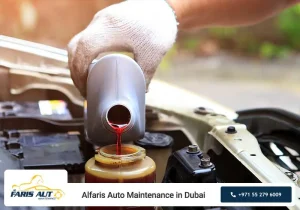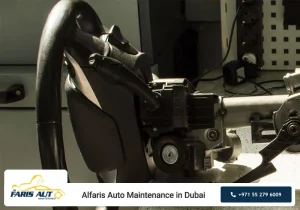Given the complexity and sensitivity of hydraulic steering operation, Hydraulic Steering Repair and Maintenance is essential to extend the lifespan of its components. By adhering to important maintenance principles, unexpected failures that could threaten driving safety can also be prevented.
The hydraulic steering system is one of the main components in a car’s steering mechanism, playing a crucial role in enhancing control and driving safety. This type of steering reduces the required force for turning the wheels by utilizing hydraulic oil pressure, allowing the driver to maneuver the steering wheel more easily and accurately.
Sudden failure of the hydraulic steering can create serious problems for both driving and the car, especially in critical situations. Therefore, it is recommended that hydraulic steering maintenance be carried out carefully and regularly. Alfaris Repair Shop in Dubai is recognized as a reputable center with years of experience in electric and hydraulic steering repairs, providing high-quality specialized hydraulic steering repair services.
- Main Components of Hydraulic Steering
- Signs and Symptoms of Hydraulic Steering Failure
- Preventive Maintenance of Hydraulic Steering
- Common Hydraulic Steering Repair Methods
- Important Considerations When Repairing Hydraulic Steering
Main Components of Hydraulic Steering

To effectively repair and maintain hydraulic steering, it is important to be aware of its components so that the best decisions can be made. The hydraulic steering system consists of several components, each playing a vital role in the operation of the system. These components include:
- Hydraulic Pump: This part is responsible for generating oil pressure within the system. The pump is activated by the motion of the car’s engine and pressurizes the oil to provide the necessary force to assist in steering. If the pump fails, the entire system’s functionality is affected, and hydraulic steering repair may be required.
- Control Valve: This valve directs the flow of oil to the steering cylinder. Depending on the direction of steering, the oil pressure is adjusted. Malfunctioning of the control valve can lead to serious issues within the hydraulic system.
- Steering Cylinder: The cylinder transmits force through hydraulic oil to the steering mechanism, allowing the wheels to turn more easily. If the cylinder fails, the driver may experience difficulty in turning the steering wheel.
- Hoses: These flexible tubes carry oil from the pump to the control valve and the cylinder. Leaks or cracks in the hoses can reduce oil pressure and cause steering performance issues.
- Hydraulic Oil: This power-transmitting liquid must be regularly checked and replaced to maintain its quality and level. Using low-quality hydraulic oil can damage the system.
Each of these components must be maintained in excellent condition to ensure optimal performance of the car’s hydraulic steering. If any defects arise in the car’s steering system, you can utilize the services of Alfaris Auto Repair.
Signs and Symptoms of Hydraulic Steering Failure
Timely recognition of hydraulic steering failure signs can prevent extensive and costly damage. It also contributes to improving the quality of maintenance for the car’s hydraulic steering system. Common signs include:
- Stiff Steering: When the force required to turn the steering wheel increases abnormally, it may indicate pump failure or low oil levels. Drivers should pay attention to this sign and visit a repair shop immediately if noticed.
- Unusual Noises: Hearing whistling, grinding, or any unusual sounds while turning the steering wheel is a sign of a malfunction in the pump or a failure of the control valve. These sounds are typically warning signs and should not be ignored.
- Oil Leaks: The presence of hydraulic oil spots under the car or around the steering area indicates a leak in the system that must be addressed promptly. Oil leaks can lead to more serious problems.
- Vibration and Unresponsiveness: If there is vibration or a delay in steering response, the cylinder or hoses may be malfunctioning. These signs usually indicate the need for hydraulic steering repair.
Paying attention to these signs and promptly addressing hydraulic steering repair can prevent more serious issues.
Preventive Maintenance of Hydraulic Steering

Preventive maintenance is the best way to extend the lifespan of hydraulic steering. Important measures include:
- Regular Inspection and Oil Replacement: A decline in quality or low oil levels can quickly damage the system. Oil changes should be performed according to the car manufacturer’s recommendations. Typically, hydraulic oil should be replaced every 40,000 kilometers or once a year, though this number may vary between cars. Properly conducting this maintenance event is essential for reducing the need for hydraulic steering repairs.
- Periodic Inspection of Hoses and Connections: Identifying small leaks or cracks in the hoses can help prevent larger failures. Drivers should carefully inspect hoses and take immediate action if any damage is observed.
- Routine Services: Regular inspections and proper repairs using modern equipment by professionals help maintain optimal steering performance. These services usually include comprehensive inspections of the hydraulic system, oil changes, hose replacements, and checks on the pump and control valve operation.
- Cleaning and Protecting Mechanical Components: Preventing dust and corrosion from entering components plays a critical role in enhancing efficiency and longevity. Using covers and guards can help maintain the health of the components.
- Using Standard Spare Parts and Quality Oil: Utilizing original parts and high-quality oil recommended by the manufacturer ensures proper functioning of the steering system. Drivers should avoid purchasing cheap parts.
These simple yet vital maintenance practices help prevent unexpected failures and additional costs. To ensure repair quality, you can benefit from Alfaris services in Dubai, including suspension and steering system repairs.
Common Hydraulic Steering Repair Methods
When problems arise, actions are taken to repair and maintain hydraulic steering, which typically include the following:
- Repair or Replacement of the Hydraulic Pump: If the pump fails to generate the necessary pressure, repair or replacement is essential. This process usually requires high technical knowledge and specialized equipment.
- Leak Repair and Replacement of Washers and Hoses: Addressing any oil leaks and replacing worn components is crucial for maintaining system pressure. Leaks can quickly lead to serious problems.
- Re-adjustment of the Control Valve: If there is a disruption in oil flow, adjusting the control valve can improve system performance. These adjustments are usually performed at specialized repair shops.
- Repair or Replacement of the Steering Cylinder: Failure in the cylinder can cause steering stiffness and reduced accuracy, requiring specialized repair. In some cases, complete cylinder replacement may be necessary.
Alfaris Specialized Repair Shop, equipped with advanced technology and high technical expertise, is the best option for specialized hydraulic steering repairs. Timely and professional repairs reduce the risk of serious failures and enhance driving safety. To contact this facility, you can reach out through the “Contact Alfaris” section on the website.
Important Considerations When Repairing Hydraulic Steering

To perform safe and effective hydraulic steering repair and maintenance, certain considerations must be followed. The first point is to use specialized equipment and proper tools. Repairing hydraulic steering without the correct tools diminishes the chances of success. Precise and appropriate tools for working with hydraulic systems are crucial.
Safety principles must be observed during any repair task. Working with hydraulic systems requires attention to the dangers of oil pressure and moving parts to prevent injury to individuals or damage to the car. Wearing safety glasses and gloves when handling oil and hydraulic equipment is recommended.
Hydraulic steering repairs are specialized tasks that require deep knowledge and skills regarding the structure and operation of the system. Consulting with experienced professionals can enhance the quality of repairs. Visiting reputable centers for complex repairs significantly contributes to reliable repair outcomes. Alfaris Repair Shop guarantees the assurance of work quality. These centers are equipped with advanced technology and experienced professionals who can provide superior services.
These considerations help reduce additional costs and enhance safety, contributing to the longevity of the car’s hydraulic steering system. Conducting periodic inspections, timely hydraulic oil changes, and paying attention to early signs of failure are crucial for increasing the lifespan of this vital system. Noticing signs such as stiff steering, unusual noises, and oil leaks allows drivers to take quick and correct action before serious failures occur.
If you are looking for specialized and high-quality services in the field of hydraulic steering repair and maintenance, contact Alfaris Repair Shop today! We are here to ensure the health and safety of your car.




